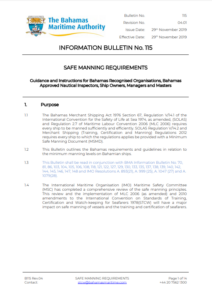The Bahamas Maritime Authority issued guidance for safe manning requirements, reiterating that SOLAS Regulation V/14.2 and Merchant Shipping (Training, Certification and Manning) Regulations 2012 require ships to be provided with a Minimum Safe Manning Document (MSMD).
The Bahamas Merchant Shipping Act 1976 Section 67, Regulation V/14.1 of SOLAS and Regulation 2.7 of MLC 2006 requires every ship to be manned sufficiently and efficiently.
In accordance with Regulation I/14 of the STCW Convention, the company is responsible for ensuring that the ship is manned in compliance with the SMD by properly qualified, certificated and medically fit seafarers. Similar requirements are also laid down in paragraph 6 of the ISM Code.
The Company shall make an application for a safe manning document following an assessment that take into consideration, the guidelines in this Bulletin and IMO Resolutions A. 893(21), A. 999 (25), A. 1047 (27) and A.1079(28).
The proposed minimum manning level is not limited to the watchkeeping personnel but should now include any additional persons deemed necessary for the safe operation of the vessel taking into consideration the international guidelines and the following:
Principles
The capability to:
- maintain safe navigational, port, engineering and radio watches in accordance with regulation VIII/2 of the 1978 STCW Convention, as amended, and also maintain general surveillance of the ship;
- moor and unmoor the ship safely;
- manage the safety functions of the ship when employed in a stationary or near-stationary mode at sea;
- perform operations, as appropriate, for the prevention of damage to the marine environment;
- maintain the safety arrangements and the cleanliness of all accessible spaces to minimize the risk of fire;
- provide for medical care on board ship;
- ensure safe carriage of cargo during transit;
- inspect and maintain, as appropriate, the structural integrity of the ship; .9 operate in accordance with the approved Ship’s Security Plan; and
The ability to:
- operate all watertight closing arrangements and maintain them in effective condition and also deploy a competent damage control party;
- operate all onboard fire-fighting and emergency equipment and life-saving appliances, carry out such maintenance of this equipment as is required to be done at sea, and muster and disembark all persons onboard; and
- operate the main propulsion and auxiliary machinery including pollution prevention equipment and maintain them in a safe condition to enable the ship to overcome the foreseeable perils of the voyage.
Onboard functions:
- ongoing training requirements for all personnel, including the operation and use of fire-fighting and emergency equipment, life-saving appliances and watertight closing arrangements;
- specialized training requirements for particular types of ships and in instances where crew members are engaged in shipboard tasks that cross departmental boundaries;
- provision of proper food and drinking water;
- need to undertake emergency duties and responsibilities; and
- need to provide training opportunities for entrant seafarers to allow them to gain the training and experience needed.
Other Relevant Factors including;
- performance of functions at the appropriate levels of responsibility;
- cargo handling;
- operation of the ship and care for persons on board;
- marine engineering, including the tasks, duties and responsibilities involved with ship’s propulsion;
- electrical, electronic and control engineering requirements;
- radiocommunications;
- the management of safety, security and protection of the marine environment;
- the number of qualified and other personnel required to meet peak workloads situations.
A specimen of the Bahamas Safe Manning Application application form (R. 106) is attached and available for download on the BMA website. The BMA will also accept a written application provided it has all the necessary information, including the details of the ship, its equipment and the intended area of operation.
The applying Company may be required to provide additional supporting information such as the Muster List, manning for mooring operations, hours of rest schedule, in order to clarify the proposed manning levels which should enable all such operations.
If additional information/clarification is required, the BMA may issue a conditional SMD during this process.
The “Other” category on Form R.106 allows the applicant to make their assessment of the shipboard operations and propose persons that are allocated additional tasks.
These persons maybe those non watchkeepers that are required or are allocated emergency duties, mooring operation, crowd control (on a passenger ship), safe cargo operation (on tanker), etc.
Passenger ships, offshore units or any other vessel that may have different manning levels dependent on the vessel’s operational status (e.g. FPSO repositioning, passenger ship with different passenger complement) should reference this information and propose a manning scale linked to the relevant condition.
As an example, a passenger ship may have a different manning level with full passenger complement onboard as opposed to a re-positioning voyage without any passengers and likewise an FPSO manning level maybe different when underway compared to when on station.
The Company may conduct a generic assessment for sister ships which will be engaged on similar trading voyages and/or operations.
Explore more herebelow:
































































